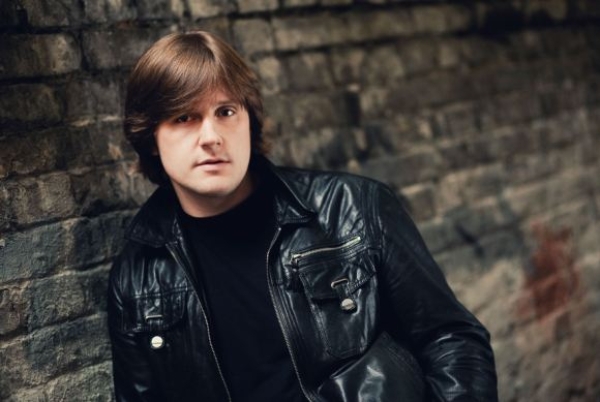Andrei Bondarenko, Glyndebourne's Eugene Onegin: 'I don't expect to be an overnight celebrity'

© Anatoliy Nazarenko
Born in 1987 in Kamenez-Podolsky, Ukraine, baritone Andrei Bondarenko trained at the National Tchaikovsky Academy of Music in Kiev, the Kiev Conservatory and the Ukraine National Philharmonic Society.
Since 2007 he has been a soloist with the Mariinsky Academy of Young Singers in St Petersburg, where he has performed leading roles in Ariadne auf Naxos, Pelléas et Mélisande, and several of the great Mozart operas, as well as Tchaikovsky’s Eugene Onegin.
Bondarenko has recorded for leading labels including Sony Classical and BIS, and has won prizes at numerous vocal competitions, among them the 2011 BBC Cardiff Singer of the World, where he was awarded the Song Prize.
Onegin will be the Ukrainian’s third Glyndebourne role. He previously appeared at the main festival in La bohème (as Marcello) and on tour as Dr Malatesta in Donizetti’s Don Pasquale.
You are probably best known in the UK for winning the Song Prize at the 2011 Cardiff Singer of the World competition. Do such prizes help your career?
Of course such an important competition win does help develop your career, but I don’t think that in our operatic world you automatically wake up the next morning as a celebrity. It is something that slowly helps builds your career for you.
Your youthful, heroic baritone is already well known to Glyndebourne audiences through La bohème and Don Pasquale, and now you are back to sing Eugene Onegin. What are the special challenges of this role?
Well I think this role is one of the most difficult roles in Russian music to create an image for the character, and also to sing. Tchaikovsky created a piece that has inspired singers across the world for generations; it is a difficult piece but an absolute honour to sing Eugene Onegin at Glyndebourne in the 80th anniversary.
As the opera unfolds, how do you interpret the remarkable changes in Onegin’s character over time?
As a singer these changes are not easy to interpret or to explain through your character portrayal. Onegin is young man with a difficult character that undergoes significant changes over time; but then Onegin changes his personality like all of us at different points in our lives, and crucially we see here the challenging conditions of the times in which he lived. Life was significantly more difficult then and of course love creates powerful emotions in us all.
Your repertoire is extraordinarily wide-ranging – from the great operas of Mozart and Tchaikovsky to Debussy’s Pelléas and Britten’s Billy Budd. How do you choose your roles?
I think it is very important for a young singer to choose the right repertoire for them as an individual, and Mozart is the best for a singer. These days I have great pleasure playing the roles that are close to my heart and soul, which for a singer is a privilege and a joy.
Now that you are living the hectic life of an international opera star, how do you find time to relax and study new music?
To be honest I do not have a huge amount of time to relax, I hope that in a few years as my career develops I may have a little more time to study and take life slowly, as well as have more time to relax and be with family and friends. As for new repertoire, I spend all of my free time on that, without a doubt!
What future roles are you currently preparing?
My next role will be Prince Andrei in Prokofiev's War and Peace, and then I will be working on a recording of the title role in Don Giovanni, with Sony Classical, which is very exciting indeed.
Do you maintain musical links with your own country? In what ways?
I always go back to Ukraine to perform, specifically in recitals. And in the future we are planning to organise a small opera festival and stage pieces with Ukrainian and international musicians which is an exciting proposition for me!
I get the impression that song is just as important to you as opera. More so, possibly. Do you approach both art forms in the same way?
Yes, I approach these pieces in the same way. In opera we tell intricate stories to people, and with song, we make sure each and every song tells a different story. Both are wonderfully detailed pieces to work on and both need dedication and commitment.
After Glyndebourne, when will you next be back in the UK?
The next thing for me in UK is the Rachmaninov Spring Cantata with the London Philharmonic Orchestra and Vladimir Jurowski conducting. That'll be in February 2015. It will be a real treat for me as a professional opera singer.
It would be marvellous to see and hear you in Billy Budd here in the UK. Can we hope for that to happen one day?
Oh, it would be so amazing to do it here in the UK where Benjamin Britten has such history. I hope very much that at some time soon I will be able to perform that role, and hope I will not disappoint audiences with my English – which I am still learning!
Eugene Onegin opens at the 2014 Glyndebourne Festival on Sunday 18 May. For further opera coverage, visit WhatsOnStage.com/Opera










